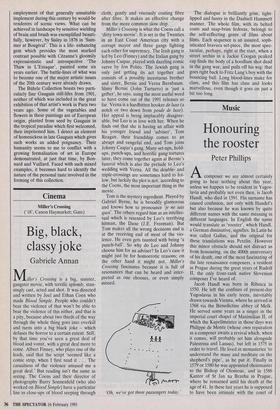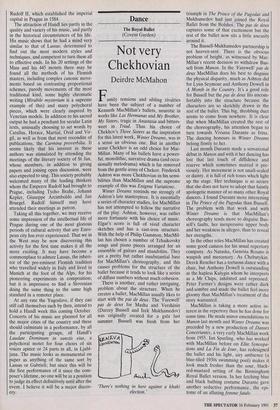Music
Honouring the rooster
Peter Phillips
Acomposer we are almost certainly going to hear nothing about this year, unless we happen to be resident in Yugos- lavia and probably not even then, is Jacob Handl, who died in 1591. His surname has caused confusion, not only with Handel's but also because he was known by quite different names with the same meaning in different languages. In English the name would translate as 'rooster', which Handl, a German diminutive, signifies. In Latin he was called Gallus, and the original for these translations was Petelin. However this minor obstacle should not distract ;us from honouring, on the 400th anniversary of his death, one of the most fascinating of the late renaissance composers, a resident in Prague during the great years of Rudolf II, the only front-rank native Slovenian composer I've heard of.
Jacob Handl was born in Ribnica in 1550. He left the confines of present-day Yugoslavia in his early teens, inevitably drawn towards Vienna, where he arrived in 1568 via the Benedictine abbey of Melk. He served some years as a singer in the imperial court chapel of Maximilian II, of which the Kapellmeister in those days was Philippe de Monte (whose own reputation as a composer awaits a revival which, when it comes, will probably set him alongside Palestrina and Lassus), but left in 1575 in order to travel. He lived in monasteries `to understand the muse and meditate on the shepherd's pipe', as he put it. Finally in 1579 or 1580 he was appointed choirmaster to the Bishop of Olomouc, and in 1586 Kantor of St Jan na Brzehu in Prague, where he remained until his death at the age of 41. In these last years he is supposed to have been intimate with the court of Rudolf II, which established the imperial capital in Prague in 1584.
The attraction of Handl lies partly in the quality and variety of his music, and partly in the historical circumstances of his life. His music shows that he had a mind very similar to that of Lassus: determined to find out the most modern styles and techniques, and competent to turn them all to effective ends. In his 20 settings of the Mass and his 445 motets there may be found all the methods of his Flemish masters, including complex canonic move- ments based on contrasting proportional schemes, parody movements of the most traditional kind, some highly chromatic writing (Mirabile mysterium is a supreme example of this) and many polychoral pieces, which were clearly inspired by Venetian models. In addition to his sacred output he had a penchant for secular Latin texts, unusually choosing to set words by Catullus, Horace, Martial, Ovid and Vir- gil, as well as from that most recondite of publications, the Carmina proverbilia. It seems likely that his interest in these authors was stimulated by attending the meetings of the literary society of St Jan, whose members, in addition to giving papers and joining open discussion, were also expected to sing. This society probably welcomed many of the leading thinkers whom the Emperor Rudolf had brought to Prague, including Tycho Brahe, Johann Kepler, Giuseppe Arcimboldo and Jan Bruegel. Rudolf himself may have attended their meetings as patron.
Taking all this together, we may receive some impression of the intellectual life of Prague during one of the most glorious periods of cultural activity that any Euro- pean city has ever experienced. That we in the West may be now discovering this activity for the first time makes it all the more exciting. It may have become a commonplace to admire Lassus, the inheri- tor of the pre-eminent Flemish tradition who travelled widely in Italy and lived in Munich at the foot of the Alps, for his pioneering experiments in composition; but it is impressive to find a Slovenian doing the same thing to the same high standard in a remoter place.
At any rate the Yugoslays, if they can still call themselves such by then, intend to hold a Handl week this coming October. Concerts of his music are planned for all the major cities of the country and these should culminate in a performance, by all the participating groups, of Handl's Laudate Dominum in sanctis eius, a polychoral motet for four choirs of six voices apiece or 24 parts in all, in Ljubl- jana. The music looks as monumental on paper as anything of the same sort by Lassus or Gabrieli; but since this will be the first performance of it since the com- poser's lifetime, no one will be in a position to judge its effect definitively until after the event. I believe it will be a major discov- ery.



















































 Previous page
Previous page